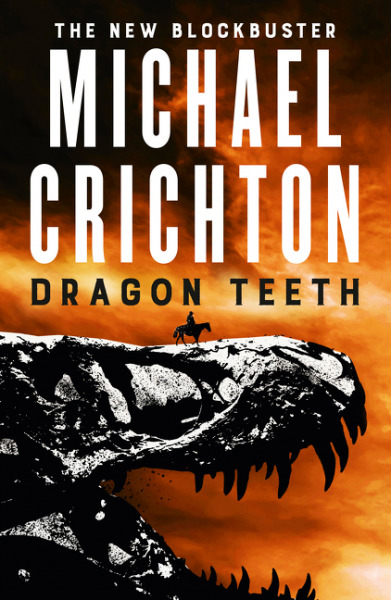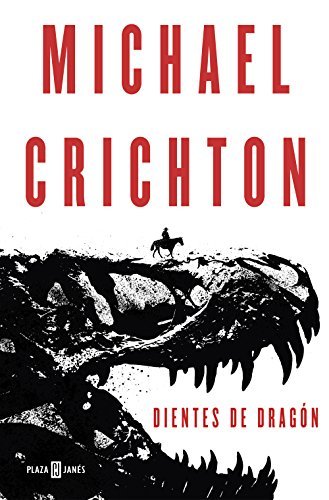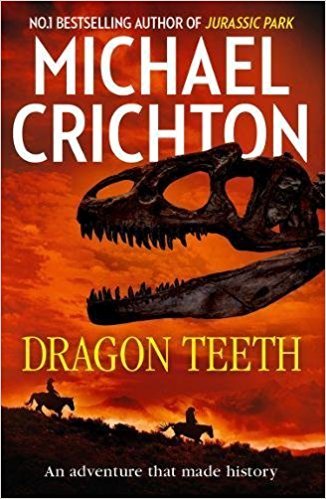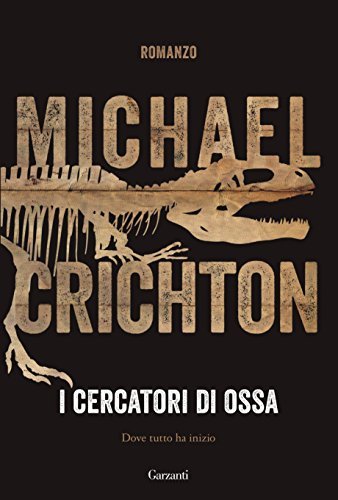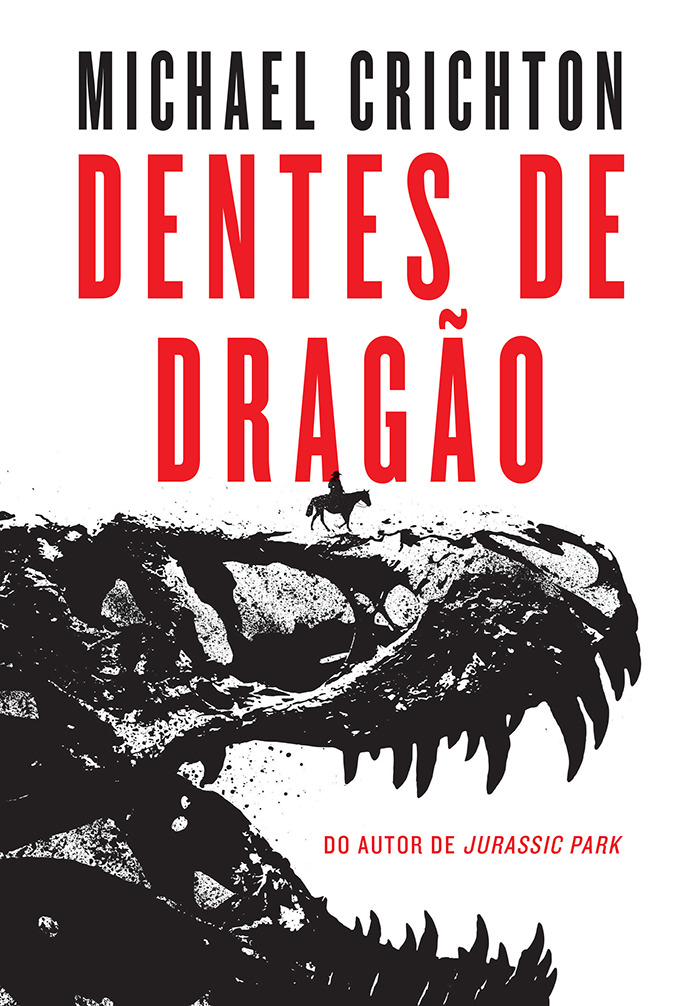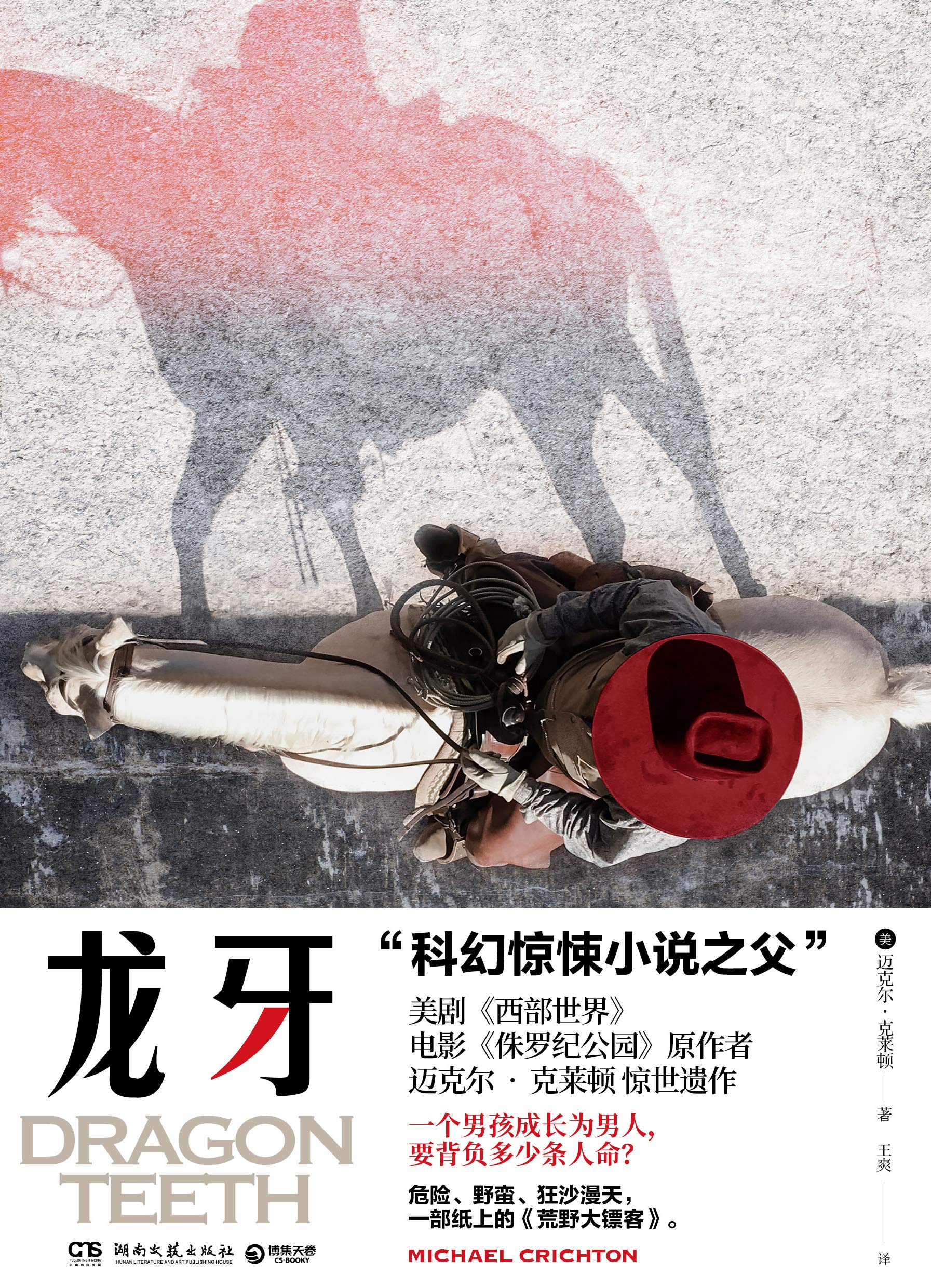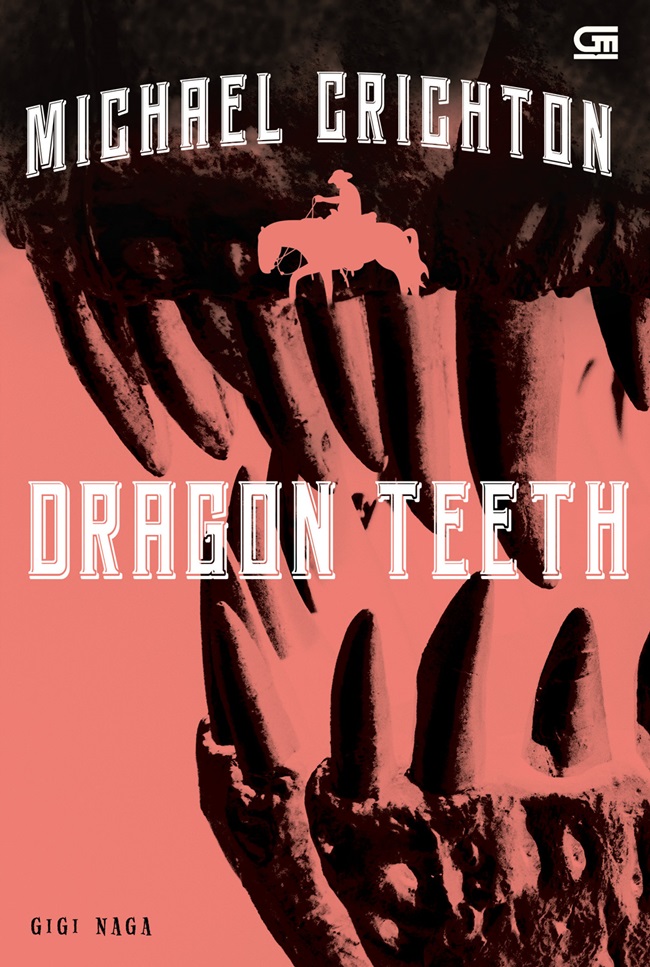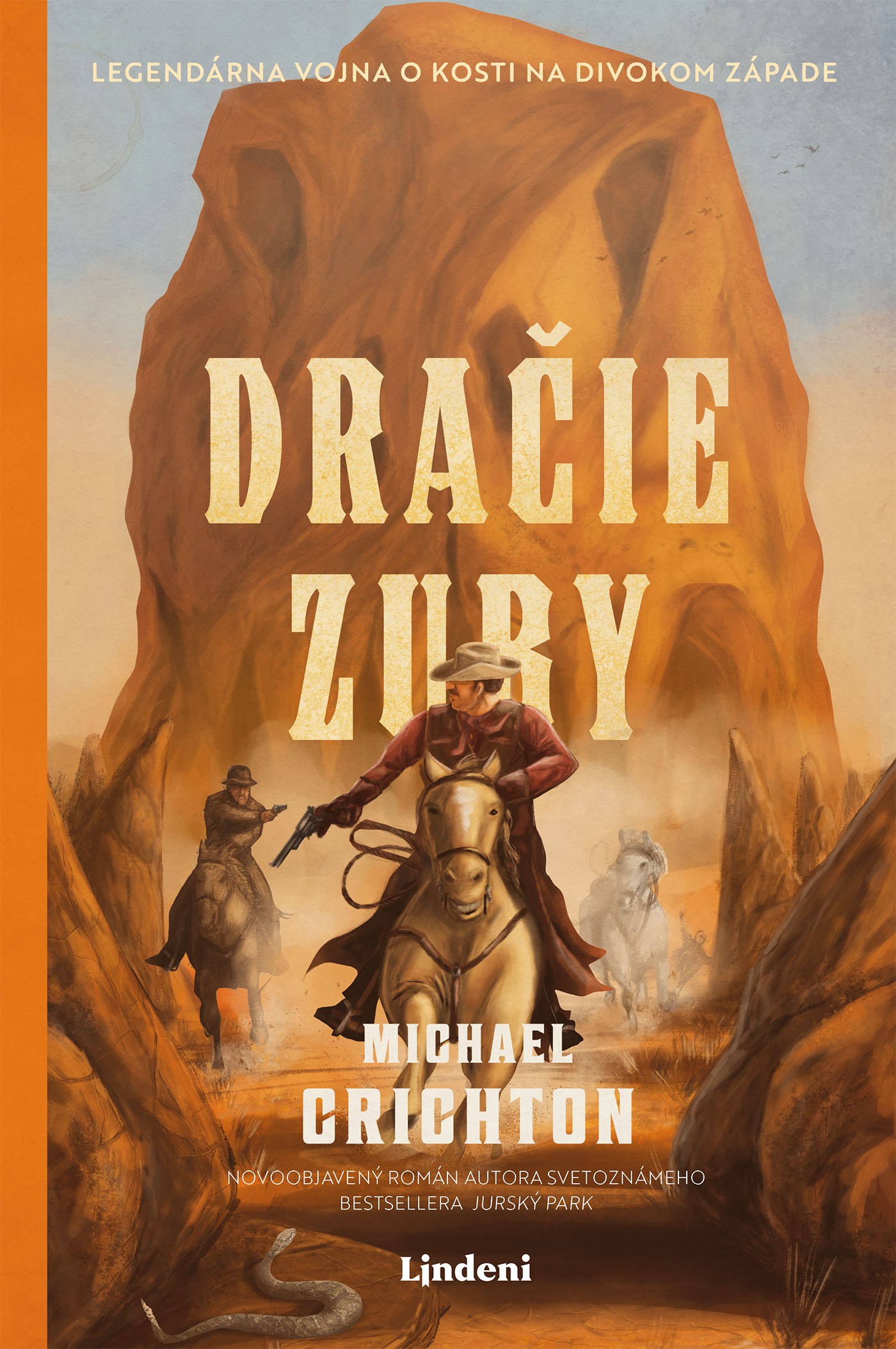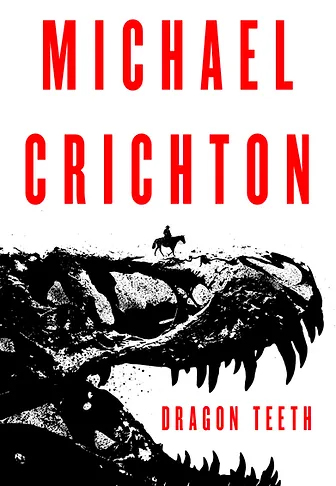Dragon Teeth
Synopsis
Michael Crichton, the #1 New York Times bestselling author of Jurassic Park, returns to the world of paleontology in this recently discovered novel—a thrilling adventure set in the Wild West during the golden age of fossil hunting.
The year is 1876. Warring Indian tribes still populate America’s western territories even as lawless gold-rush towns begin to mark the landscape. In much of the country it is still illegal to espouse evolution. Against this backdrop two monomaniacal paleontologists pillage the Wild West, hunting for dinosaur fossils, while surveilling, deceiving and sabotaging each other in a rivalry that will come to be known as the Bone Wars.
Into this treacherous territory plunges the arrogant and entitled William Johnson, a Yale student with more privilege than sense. Determined to survive a summer in the west to win a bet against his arch-rival, William has joined world-renowned paleontologist Othniel Charles Marsh on his latest expedition. But when the paranoid and secretive Marsh becomes convinced that William is spying for his nemesis, Edwin Drinker Cope, he abandons him in Cheyenne, Wyoming, a locus of crime and vice. William is forced to join forces with Cope and soon stumbles upon a discovery of historic proportions. With this extraordinary treasure, however, comes exceptional danger, and William’s newfound resilience will be tested in his struggle to protect his cache, which pits him against some of the West’s most notorious characters.
A page-turner that draws on both meticulously researched history and an exuberant imagination, Dragon Teeth is based on the rivalry between real-life paleontologists Cope and Marsh; in William Johnson readers will find an inspiring hero only Michael Crichton could have imagined. Perfectly paced and brilliantly plotted, this enormously winning adventure is destined to become another Crichton classic.


Passage 1
Philadelphia was the busiest city in America that May, nearly bursting with the vast crowds that flocked to attend the Centennial Exposition of 1876. The excitement that surrounded this celebration of the nation’s hundredth anniversary was nearly palpable. Wandering the soaring exhibition halls, Johnson saw the wonders that astonished all the world — the great Corliss steam engine, the exhibits of plant and agriculture from the states and territories of America, and the new inventions that were all the rage.
The prospect of harnessing the power of electricity was the newest subject: there was even talk of making electrical light, to illuminate city streets at night; everyone said Edison would have a solution within a year. Meanwhile there were other electrical wonders to puzzle over, particularly the curious device of the tele-phone.
Everyone who attended the exposition saw this oddity, although few considered it of any value. Johnson was among the majority when he noted in his journal, “We already have the telegraph, providing communications for all who desire it. The added virtues of voice communication at a distance are unclear. Perhaps in the future, some people will wish to hear the voice of another far away, but there cannot be many. For myself, I think Mr. Bell’s tele-phone is a doomed curiosity with no real purpose.”
Despite the splendid buildings and enormous crowds, all was not entirely well in the nation. This was an election year, with much talk of politics. President Ulysses S. Grant had opened the Centennial Exposition, but the little general was no longer popular; scandal and corruption characterized his administration, and the excesses of financial speculators had finally plunged the nation into one of the most severe depressions in its history. Thousands of investors had been ruined on Wall Street; Western farmers were destroyed by the sharp decline in prices, as well as by harsh winters and plagues of grasshoppers; the resurgent Indian Wars in the Montana, Dakota, and Wyoming Territories provided an unsavory aspect, at least to the Eastern press, and both Democratic and Republican parties promised in this year’s campaign to focus on reform.
But to a young man, particularly a rich one, all this news — both good and bad — merely formed an exciting backdrop on the eve of his great adventure. “I relished the wonders of this Exhibition,” Johnson wrote, “but in truth I found it wearingly civilized. My eyes looked to the future, and to the Great Plains that would soon be my destination. If my family agreed to let me go.”
The Johnsons resided in one of the ornate mansions that fronted Philadelphia’s Rittenhouse Square. It was the only home William had ever known — lavish furnishings, mannered elegance, and servants behind every door. He decided to tell his family one morning at breakfast. In retrospect, he found their reactions absolutely predictable.
“Oh darling! Why ever would you want to go out there?” asked his mother, buttering her toast.
“I think it’s a capital idea,” said his father. “Excellent.”
“But do you think it’s wise, William?” asked his mother. “There’s all that trouble with the Indians, you know.”
“It’s good that he’s going, maybe they’ll scalp him,” announced his younger brother Edward, who was fourteen. He said things like that all the time and no one paid any attention.
“I don’t understand the appeal,” his mother said again, an edge of worry in her voice. “Why do you want to go? It doesn’t make any sense. Why not go to Europe instead? Someplace culturally stimulating and safe.”
“I’m sure he’ll be safe,” his father said. “Only today the Inquirer reports on the Sioux uprising in the Dakotas. They’ve sent Custer himself to put it down. He’ll make short work of them.”
“I hate to think of you eaten,” said his mother.
“Scalped, Mother,” Edward corrected her. “They cut off all the hair right around the head, after they club you to death, of course. Except sometimes you’re not completely dead and you can feel the knife cutting off the skin and hair right down to the eyebrows — ”
“Not at breakfast, Edward.”
“You’re disgusting, Edward,” said his sister Eliza, who was ten. “You make me puke.”
“Eliza!”
“Well, he does, Mother. He is a revolting creature.”
“Where exactly will you go with Professor Marsh, son?” his father asked.
“To Colorado.”
“Isn’t that near the Dakotas?” asked his mother.
“Not very.”
“Oh, Mother, don’t you know anything?” said Edward.
“Are there Indians in Colorado?”
“There are Indians everywhere, Mother.”
“I wasn’t asking you, Edward.”
“I believe no hostile Indians reside in Colorado,” his father said. “They say it’s a lovely place. Very dry.”
“They say it’s a desert,” said his mother. “And dreadfully inhospitable. What sort of hotel will you stay in?”
“We’ll be camping, mostly.”
“Good,” his father said. “Plenty of fresh air and exertion. Invigorating.”
“You sleep on the ground with all the snakes and animals and insects? It sounds horrific,” his mother said.
“Summer in the out-of-doors, good for a young man,” his father said. “After all, many sickly boys go for the ‘camp cure’ nowadays.”
“I suppose . . .” said his mother. “But William isn’t sickly. Why do you want to go, William?”
“I think it’s time I made something of myself,” William told her, surprised by his own honesty.
“Well said!” said his father, pounding the table.
In the end his mother gave her consent, although she continued to look genuinely worried. He thought she was being maternal and foolish; the fears she expressed only made him feel all the more puffed-up, brave, and determined to go.
He might have felt differently, had he known that by mid-summer, she would be informed that her eldest son was dead.
Passage 2
Passage 3


Dragon Teeth will be published by Harper, a division of HarperCollins, on May 23. It’s about a favorite Crichton subject — dinosaurs — only this time it’s historical fiction set during the 1870s and the “Bone Wars” between two real-life paleontologists in the American West.
In the News
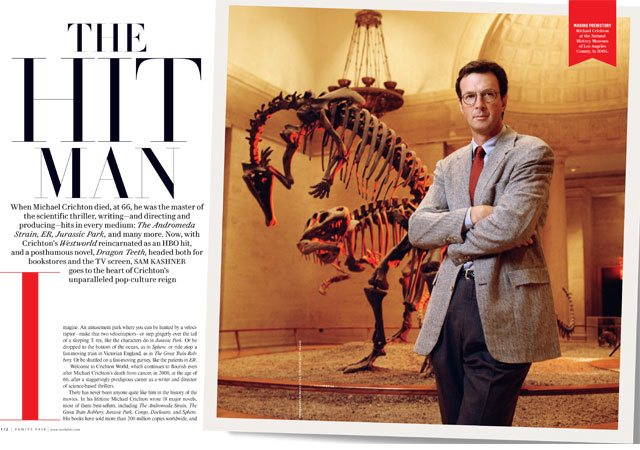

Michael Crichton featured in Vanity Fair
Check out this fantastic article on Michael Crichton in the March 2017 issue of Vanity Fair magazine. The Hit Man by Sam Kashner is an incredible retrospective on Michael’s career that “goes to the heart of Crichton’s unparalleled pop-culture reign” and features quotes from Sherri Crichton about Michael’s soon to be released novel, Dragon Teeth and the The Official Crichton Archives.
Book Covers
